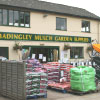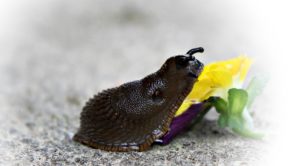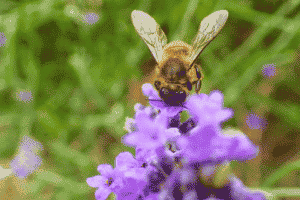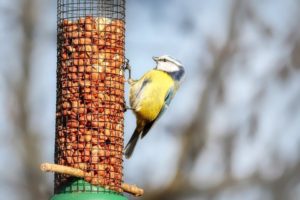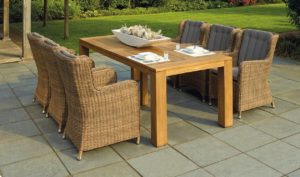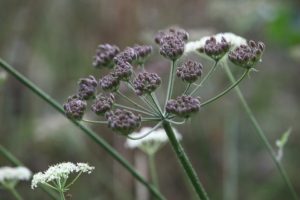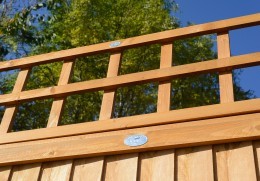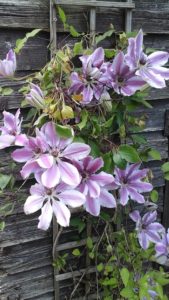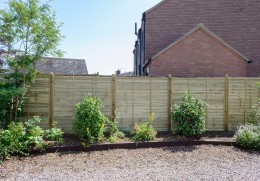Top Tips on Controlling Unwanted Pests in Your Garden
One of the biggest banes of any gardener’s life is keeping unwanted pests under control, particularly at this time of year when the first green shoots are beginning to appear and young plants are at their most vulnerable.
Here bark mulch suppliers Madingley Mulch, who provide a range of outdoor gardening supplies to customers in and around Cambridge, give advice on how to deal with some of the most common pests found in UK gardens.
Aphids
Aphids are one of the most destructive insects. Not only do they suck precious plant sap from stems and leaves, they also excrete honeydew on leaves, which promotes fungus.
The best thing you can do is to encourage any ladybirds in the garden because they are the aphids’ natural predator. Aphids can also be removed from plant stems with a well-directed stream of water from a garden hose, or picked off with garden gloves. They can be killed by dropping them into a bucket of soapy water (along with any affected plant growth).
Now is the right time of year to take action before any aphid infestation has fully taken hold. This will protect growing plant shoots when they are at their most vulnerable.
Caterpillars
Winter moth caterpillars are among the most destructive pests. Females lay eggs between November and April on ornamental and fruit trees, as well as shrubs. When the eggs subsequently hatch out, leaves, fruits and blossom are all likely to be damaged.
It is important to be aware, however, that they are a food source for birds, beetles and hedgehogs. Therefore, if you do need to do something about them, try a grease band or tree barrier glue which will discourage the females from laying eggs.
Mice and Rats
The best way to keep rodemts out of your garden is to keep it neat and tidy, so there’s nowhere for them to hide. Check under garden sheds and decking where they might be hiding too. It is also important not leave any food scraps around (e.g. bird tables), which they could feed on.
Rats can’t survive without a water source, therefore they can be deterred by putting mesh over ponds, covers over drains, and making sure you don’t have any dripping taps outside. Mice are generally shyer than rats, but can still attack smaller plants or seedlings, so cover pots up with wire mesh.
At Madingley Mulch, we also sell traps, poison and bait to deal with any size of infestation.
Slugs and Snails
These can do an enormous amount of damage, particularly to vegetables like lettuce, sweet peas and hostas. They can also eat holes in leaves, flowers, stems and bulbs.
Some herbs like chives and mint, plus other species like fennel and foxgloves actually deter them, so planting these next to vulnerable plants will provide some protection. These types of pests can also be removed by hand, or by more sophisticated methods such as beer traps (they can’t resist these) or copper tape, which can give slugs an electric shock.
In addition, you could consider installing a water feature such as a pond, because frogs and newts are natural predators of slugs and snails.
Don’t Forget to Mulch
Organic mulches, such as those made out of bark chips, can help deter some pests as well as suffocate weeds. However, they can also act as a home for others which can be harmful if they are allowed to get out of control.
So don’t lay your mulch down too thickly (3 to 4 ins should be deep enough) and make sure it’s replaced regularly. Also don’t lay your mulch down too close to your home, and leave the plant stems clear.
At Madingley Mulch we supply a wide range of mulches (including bark mulch), soil conditioners and composts to customers from our base near Cambridge. These include Denise’s Delight, an exclusive mix of Black Fen soil, manure and other plant nutrients.
Ask the Experts
It is important to remember that every pest should have its own predator, so by artificial intervention you could be upsetting the delicate balance of nature in your garden. For example, slugs and snails can act as soil conditioners, helping to break it down. Also pesticides can cause collateral damage to other insects and plants, even if that wasn’t what you originally intended.
If you need help you can talk to our friendly, experienced staff about your pest problem and we will be happy to advise you. We stock a range of pest control products as well as weedkillers. If you would like to know more, visit our online shop or call us on 01954 212144.
For larger orders, our current timescale from order to delivery is around two weeks. We are sorry for the inconvenience caused by any delays. We are trying to increase our fleet size on a temporary basis to assist our delivery capacity. You will be contacted by our shop staff the day before your delivery.
Top Tips on Dealing with Fallen Leaves
Fallen leaves are a problem which all gardeners face at this time of year – but what’s the best way to deal with them? Here Madingley Mulch, garden mulch suppliers based on the edge of Cambridge, offer some top tips on what to do about this natural ‘windfall’.
Rake Them Up
You should always leave your lawn clear of leaves. Left unattended, they will create the perfect conditions for mould to thrive. A leaf-free lawn will also ensure the grass will grow more healthily in the springtime. Collect up the leaves with a high-quality universal rake or a leaf blower.
You should also keep leaves out of ponds and other water features. This is because the leaves will eventually sink to the bottom, decompose and form an unattractive sludge, which will encourage algae and other unwanted plant growth. Consider covering your pond with wire mesh (particularly if it’s close to a tree) or removing the leaves regularly with a device such as a dipping net.
Leaves can be left to decompose in flower beds, but only in moderation. While they return valuable nutrients to the soil, too many of them will block out the sun and can encourage diseases in prolonged spells of wet weather. The basic rule of thumb is if you can’t see the plants for the leaves, then you’re going to have a problem.
Mow Them
The alternative is to leave your leaves where they are and effectively mow them into the lawn. Put your machine on its highest setting so the leaves are shredded into tiny pieces, which then decompose within the surface of the lawn, providing an excellent soil conditioner.
Use Them as Compost
You can also add the fallen leaves to your compost heap or bin. To gain the maximum benefit, ensure the leaves are moist (but not wet) and mixed with green material such as grass clippings or waste vegetable matter. The compost should then be turned over once a month to allow the oxygen to circulate and help with the decomposition. Over time the leaves and waste will break down into a thick compost which can be spread over your beds, providing valuable nutrients for your plants and flowers.
If you don’t have the problem of clearing up fallen leaves, or don’t have the time or space to create a compost heap, then you can still give your plants a boost. Madingley Mulch supply a range of soil conditioners, composts and mulches to gardeners across the Cambridge area which have proved highly effective in suppressing weeds and retaining moisture within the soil. These include Denise’s Delight and Tony’s Tonic, both of which contain a mix of horse manure, wood shavings and other plant nutrients.
Use Them as Insulators
Leaves make excellent insulators for colder areas of your home, such as basements, garages and garden sheds. Collect them up by whatever method you prefer, let them dry out and transfer them into bags. Packed tightly together, these will keep the immediate environment warm. Once winter is over you can still use them as part of a soil conditioner or compost.
Madingley Mulch – Garden Mulch Suppliers from Cambridge
As well as mulches, soil conditioners and composts, Madingley Mulch also stock a wide range of other outdoor gardening supplies. If you need any fencing, decorative stones or pebbles, edging, paving or patio slabs, then we are the people to contact. Follow this link to visit our online shop.
We offer free delivery on all orders within a 15-mile radius of our operation just outside Cambridge. There is a standard £20 delivery charge applied up to a radius of 24.5 miles, and we can also deliver further afield as well. Our weekly delivery routes include St Ives, St Neots, Huntingdon, Newmarket, Ely, Haverhill and Saffron Walden. Due to the coronavirus situation, we are currently aiming to deliver all orders within 2-3 weeks depending on product availability.
Encouraging Wildlife to Thrive in Your Garden this Winter
It can be tempting to clear everything away in your garden for the winter months – but while you have tidied up your plants and shrubs, what about the wildlife that lives there? They will be having a tough time coping not just with the lower temperatures but also the lack of food.
Madingley Mulch, suppliers of mulches, compost and soil conditioners to customers in the Cambridge area, have identified these key ways in which gardeners can help birds, amphibians, insects and small mammals to survive through the winter.
Feed the Birds
Birds really are gardeners’ feathered friends. They allow your garden’s eco-system to thrive, eating pests which damage your flowers and shrubs, and helping with plant pollination.
Leaving out nuts, seeds and fat balls will help most species to survive and thrive over the winter. It’s best to buy purpose-built feeders, as squirrels, pigeons and other creatures can all get to the food first if it’s left on a traditional bird table. Don’t forget to leave out a bowl of water too, as birds and other animals still need to drink even when it’s cold.
Beware of Iced Ponds
Figures suggest there are roughly 2 million garden ponds in the UK, and as well as being home to fish and amphibians they also provide other creatures with a reliable source of drinking water. However, if your pond does freeze over, not only does this source disappear, but the ice can cause a build-up carbon monoxide, methane and other gases in the water which can be potentially toxic to some forms of wildlife.
Melting a hole in the ice by placing a saucepan full of hot water on the surface will be a genuine lifeline to all the wildlife which uses the pond. You can also float a ball on the pond’s surface which will keep the water around it moving and making a freeze over less likely. You should avoid breaking the ice with a hammer, or pouring boiling water directly onto the ice, as this could send shockwaves through the pond which could harm wildlife.
Remember: Amphibians like toads and frogs also like to seek shelter in warm compost heaps, so take care when you turn these over.
Looking After Insects
Insects which don’t go into hibernation need ‘mess’ and flowers to survive the winter. The insects that do fly still need a source of pollen, so if you have any ivy don’t cut it back too hard as this is one of the few plants which flowers in winter. Other insects overwinter in the hollow stems of perennials, so don’t prune these too vigorously either.
Leave out piles of rotting logs in damp or shady areas of your garden, putting fallen leaves in any cracks. This arrangement will provide shelter for centipedes, woodlice, beetles and other insects, as well as a valuable supply of food for birds.
Hedgehogs and Other Mammals
Hedgehogs will appreciate a supply of fresh water and food over winter. Dog or cat food is a good option, but you should avoid a fish-based recipe as well as milk or bread – all of these can upset hedgehogs’ stomachs or cause dehydration. Check bonfires before lighting them as these prickly creatures appreciate the warmth and shelter they offer.
Badgers enjoy lightly cooked meats, fruit, peanuts and cheese to supplement their diet. As well as nuts, squirrels also like sunflower seeds and chopped carrots, while mixed seeds can be left out for smaller mammals.
Don’t Forget to Mulch
Laying down some mulch on your flowerbeds – or replenishing an existing layer – will also help wildlife. It is a ready-made breeding ground for stag beetles and other small insects. As the materials break down and decompose, they will enrich the soil and nourish your plants at the same time.
At Madingley Mulch we supply a range of composts, mulches and soil conditioners from our base on the outskirts of Cambridge. These include Denise’s Delight and Tony’s Tonic, which – thanks to their mix of wood shavings, horse manure and other nutrients – have proved highly effective in helping plants flourish all the year round.
Soil Conditioners, Mulches and Compost from Madingley Mulch
As well as soil improvers, Madingley Mulch stock a wide range of other gardening, landscaping and building supplies for the keen horticulturalist. These include aggregates, decorative stones and cobbles, paving slabs, fencing and turf.
You can visit our online shop by clicking on this link. We operate a weekly delivery service, and this is free if you live within 15 miles of our base on the outskirts of Cambridge. If you live up to 24.5 miles away, then a standard £20 charge applies, and we can arrange deliveries further afield as well. At the moment, we are aiming to deliver all orders between two and three weeks of them being placed.
Five Top Gardening Trends for 2020
It’s that time of the year again when gardeners all across the country are planning for the year ahead. But what plants and features should you be looking to include as we enter a new decade?
Madingley Mulch have put together some of the key features that experts are forecasting to be popular with gardeners in 2020 – the emphasis this year very much being on eco-friendly solutions.
Popular Pollinators
We are all aware of the importance of the bee and other pollinating insects. So this year horticulturalists believe that plants that encourage insects to pollinate such as lavender and rhododendrons will be popular. In addition, marigolds and sunflowers which support ladybirds and lacewings, and deter aphids, will also help gardeners protect their prized plants.
Because insects thrive under log piles, in ponds, and in other similarly ‘wild’ environments, this year will see many gardens become a lot less neat, and more a reflection of natural habitats.
Growing Your Own
With global warning an ever increasing problem at home and abroad – last winter saw record temperatures of over 20C and heavy snow in the UK alone – 2020 will see us all try to cut our carbon footprints. One great way of doing this is to grow your own food.
As a consequence of modern tastes will see more chillies chickpeas and lentils grown in vegetable patches this year, alongside more traditional choices such as beans and peas. This drive to produce more of our own food will see more salad vegetables and herbs in our gardens too.
Natural Soil
With the numbers of native insects and some wildlife in decline, fertilisers will become less popular in 2020. As gardeners seek more natural ways of protecting their plants and support their growth, composts and soil conditioners are forecast to become more popular.
Spent mushroom compost – which Madingley Mulch supplies to gardeners in Herts, Cambrigeshire, Suffolk and Essex – is an organic way to improve the heavy clay soil that is typical in East Anglia. You can also suppress weeds organically by using products such as Denise’s Delight and Tony’s Tonic, both of which are exclusively available from Madingley Mulch.
Think Big Indoors
According to the Royal Horticultural Society there will be other trends not driven by the environment. With houseplants set to move off from narrow windowsills and into more central and showpiece locations in our homes.
Moving away from the windowsill will allow indoor gardeners to grow bigger, with supersized varieties of plants such as alocasia and monstera possible choices.
Making Maximum Use of Space
With this year’s drive to help the environment and cut our effects on it, it is more important than ever to make the most of the space in our gardens – even smaller plots. And one untapped area is our fences. That is why this year will likely see an emphasis on growing vertically, either using terracotta planters attached to fencing panels or trailing plants growing up them.
More and more people are using their gardens as extension of their homes too, with extended patio and courtyard areas, and 2020 is likely to see an increasing trend for outdoor ovens and ranges to replace barbecues.
Outdoor Gardening Supplies from Madingley Mulch
As well as soil conditioners and other natural and organic solutions such as spent mushroom compost. Madingley Mulch also offers a range of other outdoor garden supplies including garden patio slabs and fence panels to customers in Cambridge, and across East Anglia.
If you place a large or bulky order we will deliver free of charge within 15 miles of our base on the outskirts of Cambridge, and a delivery charge of £20 applies within a 24.5 mile radius, which includes places such as Ely, Huntingdon, Newmarket, Saffron Walden and Royston. We can also deliver further afield if you require.
If you want some assistance in making your garden more environmentally friendly and maximising what you can grow, contact us.
The First Garden Jobs for the New Year
All gardens need a little maintenance throughout the year, and in the winter that includes planning for the year ahead, checking boundaries and pruning.
Although the garden might be the last place you want to be in winter, there are plenty of jobs which you could and should be doing early in the New Year to ensure all your horticultural dreams come true in the months ahead.
Plan the Year Ahead
January is a good time of year to start planning a new garden or review your existing one. Think about every aspect of your garden, including wall breaks and barriers, garden furniture, new beds and borders.
Work out what you want to plant and where and order any seeds or bulbs that you can start planting in the spring.
If your soil isn’t particularly fertile, you can improve its quality by buying our exclusive garden compost and soil conditioners for the garden. Tony’s Tonic is a well-rotted manure that acts as a great winter mulch and Denise’s Delight, a rich blend of soil and compost ideal for use in raised beds. Both products will give your plants a boost and a greater chance of thriving. Tony’s Tonic is a form of compost that can be spread over the soil and is also great for growing roses.
Check Your Boundaries
The winter often means the worst of the weather including snow, ice and rain. If you do have any snow, it may leave everything looking dishevelled. This is a good time to replace or re-attach any loose panels, roofs, posts and fences and create windbreaks to protect plants.
The first thing to do is check all your main garden boundaries including any fences and walls that scale the perimeter of your garden. Make sure they haven’t been damaged by high winds and heavy rain. You can fix fences with bits of wire netting, to keep them sturdy all year-round.
Your hedges can also be affected by the bad weather, especially any heavy snowfall. Brush off any snow or ice as soon as possible. An effective way of protecting any vulnerable hedges, where necessary, is to cover them in protective wrapping and apply a thick layer of mulch at the base, to prevent the foliage from going brown. The thick layer of mulch will help to hydrate the plants and keep them warm.
There’s Still Some Pruning to Do
January is an appropriate time for tidying your garden and getting some pruning done. Apples and pear trees should be cut back now while they are still dormant. You can recycle your cut trees by shredding them for mulch or compost ready for the spring. Rose bushes should also be cut back to just above the buds and any dead branches removed.
Climbers such as wisteria and ivy will also need to be pruned and cut back to prevent any damage to walls and other nearby plants. This applies to all shrubs before the sap starts to rise and the buds break. Something else to remember is to cut down flowering perennials to ground level, which will help them flourish in the warmer months.
Feed the Birds
It’s important to put additional food and water out throughout the year, but particularly in the winter, to help make a significant contribution to supporting wildlife over the winter. Birds are every gardener’s best friend, as they help the local eco-system to thrive, assist with the pollination of plants and deter pests which can destroy your glorious garden. This will also help attract a wide variety of birds such as finches, robins to your garden and encourage those species which have not migrated to stick around.
Leave out bird tables and feeders at adjustable heights and place them in sheltered locations out of the most severe winds.
You may also want to keep some areas of your garden wild and undisturbed to ensure there are plentiful supplies of insects for the birds to feed on in the winter months. Birds will appreciate nuts, seeds and fat balls left out for them this winter.
Clean Your Tools
Cleaning your tools may not the most glamorous of jobs, but you need to be sure when the weather does improve you are ready for work in the garden. Remove all mud and leaves from spades, forks and rakes and oil from moving parts.
All pots, water butts and greenhouses should also be kept clean and clear of any debris. If you have any decorative plant pots that are not frost-proof, then empty them of soil and store them in your shed or greenhouse.
Ordering Your Outdoor Gardening Supplies from Madingley Mulch
Madingley Mulch are based in Cambridge and can meet all your gardening needs. We are leading suppliers of compost, garden mulch, soil conditioners, fence supplies and trellis fencing to customers in Hertfordshire, Essex, Suffolk and Bedfordshire. To see our full range of products, click here.
Any online orders can be delivered free to destinations within 15 miles of our base on the edge of Cambridge, and there is a standard £20 charge for all destinations within 24.5 miles. Every week our delivery routes go to Ely, Cherry Hinton, Newmarket, Huntingdon, St Ives, Duxford and the surrounding areas.
The Best Plants to Grow in Your Garden in Autumn
Just because the peak summer growing season is over, it doesn’t mean that gardeners can afford to put their feet up and relax. Autumn is a critical time of year for planting, whether for the remainder of this year or to give yourself a head start in the spring.
Madingley Mulch supply high-quality garden compost, soil conditioners and mulches to customers in Suffolk, Cambridgeshire, Essex and Hertfordshire. Here identify some of the key varieties of trees, shrubs, flowers and vegetables which you should be looking to grow at this time of year.
Late Flowering Plants
If you want to extend your garden’s growing season, then you could plant sedum and chrysanthemum around now. Other plants which flower late in the year include heathers, dahlias, cyclamen and pansies.
You can also encourage certain flowers to grow earlier than their natural season by a process known as ‘forcing’. If you keep the bulbs in an unheated indoor location, such as a cupboard, shed or garage, then the plant thinks it is winter. When it is then moved to a warmer location, it will start to bloom. Ideal candidates for this type of treatment include hyacinths and narcissus and it should give you an array of colourful blooms in time for Christmas.
There are a number of flowers which you won’t see the benefit of until spring, but which should still go into the soil now. Daffodils, geraniums and delphiniums can be sown directly outdoors, while violas and lupins should be planted under a protective frame or tunnel to ensure they survive.
Vegetables
If you do want to make use of your vegetable patch now, then most of what you plant will be for early spring consumption, such as onions, shallots, garlic and broad beans. You should be guaranteed a nice early crop of tasty veg if you start work now.
However, some types of lettuce and spinach are hardy enough to survive early winter frosts, and they make ideal features for a winter salad. It may be safer to grow them under cover or in a greenhouse.
Trees and Shrubs
Autumn is the ideal time to plant most trees and shrubs, because their roots should find it easy to establish themselves in warm, moist soil which is neither too wet nor too hard or dry. You also won’t have to do much maintenance or watering.
Japanese maple trees are at their most spectacular at this time of year, and they can be grown in smaller gardens or pots. If you are looking for something bigger, a beech tree will give your garden plenty of autumn colour. They can cope with virtually any pH or soil type, including the high-alkaline clay soil which is common in the east of England. But make sure you have enough space for one to grow in the future.
Shrubs which can safely be planted at this time of year include the berberis or barberry, and the English holly, which will ensure you have plenty of Christmas decorations over the festive period.
Lay Down Some Mulch
Whether you are planting flowers, vegetables, trees or shrubs in your garden this autumn, they will have a much greater chance of flourishing if you prepare the bed or soil with a mulch or soil conditioner. This will protect the plant from the harshest of frosts, as well as suppressing any weeds which will be competing for the soil’s valuable nutrients.
At Madingley Mulch, we supply a range of soil conditioners, mulches and garden compost to customers in Suffolk, Cambridgeshire, Hertfordshire and Essex. Our exclusive products include Denise’s Delight and Tony’s Tonic, which both contain a rich mixture of horse manure, wood shavings and other plant nutrients and will give your plants the best possible start in life.
Outdoor Gardening Supplies from Madingley Mulch
If you need any autumn gardening advice, then our friendly, experienced staff at Madingley Mulch will be happy to help. As well as our extensive range of soil improvers, we can also supply a wide range of gardening accessories, building materials and decorative stones and paving from our base on the edge of Cambridge. To visit our online shop, simply follow this link.
If you have a big order, then we offer a free delivery service to all addresses within 15 miles of our store. If you live up to 24.5miles away, then there is a standard £20 charge, and we can deliver to addresses further away as well. There is a minimum order spend of £40 if you need a lorry delivery. Our weekly delivery service goes to Royston, Cambridge, St Neots, St Ives, and many of the other major towns and villages in the region.
Five Top Tips for Effective Weed Control
Weeds are the bane of any gardener’s life – not only do they look unsightly, but they also can inhibit the growth of your flowers and shrubs by depriving them of valuable soil nutrients.
Madingley Mulch provide a wide range of gardening supplies to customers in Bedfordshire, Hertfordshire, Essex and Suffolk, as well as our home county of Cambridgeshire. Here are our top five top tips for keeping weeds under control.
Don’t Forget to Mulch
Mulches will stifle the life out of any weeds by depriving them of light. Organic mulches, such as those containing bark or wood chips, are particularly effective, as they are an ideal habitat for beetles and crickets. These insects feast on weed seeds just below the surface of the soil and prevent them from germinating.
You should always top up your mulch so it is at least 10cm (4in) deep, as this will smother established weeds. And leave a small gap around your plants, as some can be damaged by direct contact with the mulch.
Madingley Mulch supply a wide range of mulches, soil conditioners and composts which will help your plants to grow. These include Denise’s Delight and Tony’s Tonic, two exclusive products which contain horse manure, wood shavings and other effective plant nutrients.
Mind the Gaps
Weeds flourish in the gaps between plants, so crowd them out. Mass plantings of closely-spaced flowers and shrubs will be far more effective than a lot of widely-scattered ones. However, don’t be tempted to put them too close together. Remember that your plants will be competing for the same soil nutrients, and there is also a risk that you could transmit diseases from one plant to another.
Don’t Dig Too Deep
Many weeds grow from seedlings in your garden soil – but only those within an inch or two of the surface get enough light to germinate. So if you do dig out a pesky plant, all you might be doing is creating the conditions for others to thrive. Uproot them where possible, rather than digging them out, and cover the disturbed area with mulch or a new plant.
The best approach to take will depend on the weather. As the old saying has it, ‘pull when wet, hoe when dry’. So, after a spell of rain, the damp soil will allow you to uproot some weeds far more easily. However, if you have had a spell of sunny weather, then running a hoe over your bed or between rows of plants will kill most seedlings. Ideally, do this on a dry day with light winds, as the weeds will dry out on the surface of the bed rather than re-rooting themselves into moist earth.
Lawncare
Weeds growing in your lawn create a different set of problems. Regular watering, particularly during the summer, and some vigorous raking or scarifying beforehand, will help your grass grow and make it more difficult for weeds to compete for the soil nutrients. Madingley Mulch also supply a lawn top dressing mix to feed the roots of your grass.
However, persistent plants such as dandelions and daisies can still cause problems. These should be removed with a hand fork, making sure you pull out all of the root, and then reseed or returf the bare patches if necessary. The best time to do this is usually in the spring or autumn, when the soil is neither too damp nor too dry, as this provides the ideal growing conditions for the new grass seed or turf roots.
A Helping Hand
You can make your life – and your plants’ lives – easier with some artificial assistance. Weedkiller, such as Round-Up, supplied by Madingley Mulch, will kill the majority of all these unwanted plants with just one application.
We also supply Groundtex, a high-quality garden membrane which will help suppress the most stubborn of weeds, and won’t get damaged by animals. You can also use it as a sub-base for a patio and other building works, and for general ground stabilisation.
Gardening Supplies from Madingley Mulch
Whether you want mulches, composts, or other specialist products such as a weed suppressing membrane or a lawn top dressing mix, gardening supplies specialists Madingley Mulch are the people to call.
We can deliver your order whether you live in Bedfordshire, Hertfordshire, Suffolk, Essex or Cambridgeshire – this is free to all addresses within 15 miles of our base on the edge of Cambridge. If you live within 24.5miles, then a standard £20 charge applies, and we can also deliver further away as well. Follow this link if you would like to learn more about our delivery services.
How to Create a Pet-Friendly Garden
Many families love their pets just as much as their gardens, but the two don’t always go together well. Pets can do a lot of damage to plants, and vice versa – dogs and cats could eat flowers and shrubs which may be potentially poisonous.
Madingley Mulch supply soil conditioners to customers in Cambridge and the surrounding area. Here are our top five key factors to consider if you want your pets and your plants to thrive alongside each other.
Deter Animals Digging
One of the most frustrating experiences for gardeners can be to find that a prized flower bed has been dug up by your dog or cat, or by the neighbours’. Bare ground is an open invitation for animals to dig, so make sure your plants are protected in some way.
Slate chippings should deter the most active of cats and dogs. Mulches, such as Denise’s Delight, our exclusive mixture of Black Fen soil, horse manure and other plant nutrients, can also be used, with a covering of wire underneath for added protection. It’s advisable to check that your mulch doesn’t contain any ingredients which could be harmful to animals before you spread it over your beds. The same advice applies to any pesticides and fertilisers you use.
Think Big
Small, delicate flowers are more likely to be damaged by animal claws than medium-sized trees, shrubs and perennials. Viburnum, shrub roses and lavender are all sturdy plants which should be able to withstand dogs and cats running through them.
Another possible solution is to add a stone pathway at the back of the bed you have just planted out. Since dogs are instinctively drawn towards the boundaries of any garden, this should ensure any new flowers don’t get trampled.
Create Special Areas
Your cat or dog is much less likely to damage your flowers and shrubs if they are actively encouraged to use another part of the garden. In the case of dogs, consider creating a sheltered ‘digging zone’, complete with a favourite toy or two, where they can enjoy themselves.
Cats should be provided with plenty of places to climb, as well as an outdoor litter tray or patch of sand so they don’t use your beds as a giant toilet. And make sure they have somewhere to sharpen their claws like an old log. If you have plenty of places to hide, it will make them feel safer and more secure, particularly if your neighbours have cats of their own.
Add Fences for Safety
Smaller pets, such as rabbits and guinea pigs, benefit from being allowed a run-around in the garden every so often, rather than being confined to their hutches. Make sure there aren’t any holes in your fences or gates, as you will be surprised at how easily they may be able to squeeze through them. And remember that medium-sized dogs can jump at least 6ft high if you are buying a fence for your back garden.
Fences also protect vegetable gardens, ensuring that your crop won’t be damaged either by your own pets or a neighbour’s. Ponds and should also be fenced off and tool sheds locked, to prevent your animals – and any young children – from coming to any harm.
Plant Healthily
Your rabbit will love you if you have a plentiful supply of green vegetables and carrots, so why not grow your own? If you have a tortoise, then don’t feel you have to pull up all the dandelions, as they love grazing on these plants.
For times when your dog is suffering from any form of nausea or indigestion, then plant some peppermint for them to nibble on and you should find that their stomach problems will soon be eased. Equally, many common plants, including chrysanthemums, daffodils, foxgloves and hydrangeas, are potentially poisonous for your canine companion, so take care about planting these.
Cats go wild for the scent of catnip and catmint, but you should avoid planting them if you don’t have a moggy and your neighbours do – otherwise you could suddenly find your garden suffering from a feline invasion.
With Madingley Mulch
Soil conditioners specialists Madingley Mulch can help you if you want your garden – whether it’s in Cambridge, Essex, Suffolk, Bedfordshire or Hertfordshire – to become more pet-friendly.
We supply slate chippings, sand, fencing panels and posts, as well as a wide selection of mulches and composts. Our friendly, experienced staff will be able to advise you on which products will be safe to use if your house is also home to a pet or two. Follow this link if you want to know more about our current range of products.
We deliver free to all addresses within 15 miles of our base on the outskirts of Cambridge, and there is a standard £20 charge for all addresses within 24.5 miles. Deliveries further away can also be arranged. Our weekly delivery service goes to Ely, Newmarket, St Ives, St Neots, Haverhill, and many other villages and towns in the region.
Five Top Tips for Making Your Patio Stand Out
In the summer, everyone likes to spend some time outside in the garden. A patio can act as an outdoor living space where you can eat, read and relax in the fresh air – and it becomes even more enticing if you add a few finishing touches to make it look distinctive.
Madingley Mulch supply patio paving slabs and many more gardening products from their base on the outskirts of Cambridge. Here we have come up with these five top tips to help make your patio stand out.
Use Different Colours
Colour is an easy way of brightening up your patio, so give your existing furniture a fresh coat of paint with a bold colour like blue or red, or a summery yellow or orange.
The patio slabs themselves don’t have to be a uniform shape or colour. For instance, Madingley Mulch’s Indian Sandstone and Premier Riven slabs are both available in a variety of colours. The former come in Raj, Camel, Mint and Grey, while the latter are available in Dark Grey, Natural, Stone and Red.
Pick Your Potted Plants
Your patio can be used as a miniature garden, courtesy of some well-placed pots and containers. If you are using your patio as an outdoor dining room, then you can grow many of the ingredients on site – kale, cherry tomatoes and salad leaves can all be grown in pots, and many cooking herbs will flourish with enough sun.
If you just want colour, then petunias and marigolds will thrive, provided it’s warm enough. Honeysuckle and jasmine can also be trained to grow up trellises on the edge of your patio.
Even shady corners of your patio can be used to good effect, as hostas, hollies and busy lizzies won’t need much sun and will provide a lush and leafy area.
Light It Up
You don’t need to rely on your house’s lights, or call in an electrician, to illuminate your patio. Lanterns and solar-powered lamps will create some interesting effects and will allow you to maximise the use of this space, enabling you to entertain family and friends to evening meals and drinks and meaning won’t be restricted to using it during daylight hours only.
Be Radical with your Furniture
White plastic chairs and tables might be the most popular choice, but there are also many other more individual options for patio furniture. For example, large plant pots can be turned upside down and used as stools, while sawn-off wooden logs can be used as benches.
Wicker and rattan sofas, and outdoor sun loungers will encourage people to linger on the patio more than a set of straight-backed chairs. A canopy will provide plenty of shade and protect your furniture from the worst of the British summer weather too.
Have a Big Focal Point
Too many plants, whether they are in containers, or planted directly into the soil, can make your patio seem too busy. Having a single large tree or shrub as a focal point will give your outdoor space a real sense of purpose. And it doesn’t need to be a natural feature, either – any unusual item such as a statue or a firepit will serve just as well.
Patio Paving Slabs from Madingley Mulch
Madingley Mulch supply patio paving slabs to customers in Cambridgeshire, Essex, Suffolk, Hertfordshire and Bedfordshire. As well as our Indian Sandstone and Premier Riven varieties, we also stock more traditional alternatives, including Old Grey Courtyard Paving, Rutland Oakham and Textured Paving. Follow this link to see our full range.
If you are building a patio from scratch, then our friendly, experienced staff will be happy to offer advice on how to go about it. And we offer free delivery on all our orders within 15 miles of our base on the outskirts of Cambridge. For orders within 24.5 miles there is a standard £20 charge, and we can also deliver to addresses further away as well. Our weekly delivery service goes to St Neots, St Ives, Huntingdon, Royston, Haverhill, Saffron Walden, and many other towns and villages in the region.
Which Decorative Stone is Best for your Garden?
One of the key ways in which you can make your garden stand out is by introducing adding decorative stones to it. But there are plenty of different varieties to choose from – so which one is best for you?
Madingley Mulch supply decorative garden stones to customers in Hertfordshire, Cambridgeshire, Essex, Bedfordshire and Suffolk. Here we look at some of the main advantages that each type can offer.
Slate Chippings
If getting weeds under control is your priority – perhaps because you want a low-maintenance garden – then slate chippings are an excellent choice. They effectively act as a form of mulch, suppressing the unwanted plants at source, while also retaining moisture for the flowers and shrubs you do want to encourage. However, because the slate doesn’t have any organic content, it won’t work as well as a traditional mulch.
Gravel
This comes in all shapes and sizes, and it has a variety of different functions. For instance, smaller types such as pea gravel will drain very effectively if you use it as a form of mulch in flower beds and pots.
However, the smaller stones can shift about underfoot and under car wheels as well, which means it is less suitable as a base for a path or driveway. A more substantial type of stone, such as granite chippings, is a better choice in these circumstances, as the stones are larger and more irregularly shaped.
Pebbles and Cobbles
These rounded stones have a smooth finish which makes them a stylish, attractive addition to any garden. They can be used as part of a rock garden or rockery, or as infill in more conventional flower beds.
Pebbles and cobbles will also help protect your plants, as they will deter people from walking on them. Pets, particularly cats, are less likely to dig them up or use them as a toilet than they might do with a conventional mulch or gravel.
Larger Rocks and Boulders
Larger stones, rocks and boulders are an extremely versatile and durable ingredient for many gardeners. If you find that part of your garden is a ‘no-grow’ zone, maybe because it doesn’t get much sun or the soil quality is poor, then buy a few large rock or boulders and you have the starting point for a rockery or alpine garden. The stones will survive in all weathers, and they will also act as a shelter for any plants you do introduce in and around them.
You can also use these larger stones in a more functional way. For instance, you can arrange them to keep items such as waste bins and hosepipes hidden from view, as a boundary to divide up one part of your garden from another, or as part of a safety feature such as a pond wall.
Decorative Garden Stones from Madingley Mulch
At Madingley Mulch we can supply a wide selection of decorative garden stones to customers in Hertfordshire, Suffolk and Essex as well as our home county of Cambridgeshire. These include 20mm and 40mm slate chippings in blue, plum and green. Our range of gravel includes 6mm horticultural grit and shingle, 10mm blue stone and gravel, 20mm charcoal stone and golden gravel, and green or pink/grey granite chippings.
We also stock a selection of associated products, such as weed suppressant membranes and crushed limestone and pure granite, which you can lay down as a sub-base layer underneath larger stones and cobbles. Follow this link to check out our full range of products.
If you do want to place a substantial order for some of our decorative stones, we offer free delivery to all addresses within 15 miles of our base on the outskirts of Cambridge. There is a £20 charge to all locations within 24.5 miles, and we can deliver further away as well. Our regular weekly delivery service operates in Haverhill, Saffron Walden, Comberton, and many other towns and villages in the area.
Top Trends from This Year’s Chelsea Flower Show
The Chelsea Flower Show, an annual event organised by the Royal Horticultural Society (RHS), is the jewel in the British gardening crown. Medals here are among the most sought-after across the whole of the UK.
The show also acts as an inspiration to horticulturalists across the country. At Madingley Mulch, as garden supplies specialists in the Cambridge area, we take an interest in what’s new at Chelsea, and here we look at five top trends from this year’s show.
The Natural Look
Mark Gregory, who won a Gold Medal for his Welcome to Yorkshire garden, put a premium on cornflowers, wild lupins and cow parsley (above) as he recreated a spring meadow in a garden setting. The Duchess of Cambridge, Kate Middleton, also designed a garden called Back to Nature, which included a swing seat and a treehouse alongside a variety of wild green shrubs and trees.
Reusing and Upcycling
Graham Bodle, who won a Silver Gilt medal for his Walker’s Forgotten Quarry entry, proved that even the most unlikely of materials can be put to good use in a garden. A rusty old stove functions as a pizza oven, while bent pipes are used as a handrail. The whole effect was completed by using reddish-brown-coloured plants such as primulas, acers, geums and epimediums.
Child’s Play
The winner of the Gold Medal in the Space to Grow category, Jody Lindgard, crammed as much as he could into his Montessori Children’s Centenary Garden. The result was an explosion of colour, with tangerine dahlias vying for space with rich blue delphiniums and bright pink peonies. He also grew upwards, with his green wall containing several different types of herbs, edible flowers and vegetables.
Be Bold with Trees
One of the most notable features of this year’s show were the number of designers who made full use of eye-catching trees. Chris Beardshaw, in his Gold Medal-winning Morgan Stanley garden, used a huge pine, while monkey puzzle trees showed up in a number of other entries.
Optical Illusions
Another space-creating idea seen at the show was the use of dramatic hard landscaping features. Joe Perkins, who won a Gold in the Space to Grow category, used weathered, reclaimed timber to create a decking, a water feature and a copper and steel canopy, all set at unusual angles. The effect was topped off with a variety of pebbles, rocks and other aggregates.
High-quality Garden Supplies from Madingley Mulch
If you want to achieve effects inspired by Chelsea in your garden, Madingley Mulch can help. We supply a wide variety of mulches, barks, soil conditioners and composts to help your plants thrive, whether you are growing pine or monkey puzzle trees, dahlias or delphiniums, or primulas and acers. Our soil improvers include Tony’s Tonic and Denise’s Delight, a conditioner with an exclusive mix of Black Fen soil, horse manure, wood shavings and other plant nutrients.
We also stock a variety of hard landscaping materials. These include building sand and ballast, plus a selection of gravels, round stones, shingle, decorative stones and pebbles.
Madingley Mulch operates a free delivery service on all garden supplies orders within 15 miles of our base on the edge of Cambridge. We have regular weekly runs to Haverhill, Saffron Walden, Royston and Huntingdon, along with many other towns and villages in the region. There is a standard £20 charge if you live up to 24.5 miles away, and we can also deliver further afield. Browse our products by clicking the link above.
Which Type of Wooden Fencing is Best for Your Garden?
Wooden fences have stood the test of time – they are an affordable way of marking out and protecting your garden, as well as acting as a natural complement to all the flowers, shrubs and trees you want to grow.
Madingley Mulch supply a wide range of fence panels to customers in Cambridge and the surrounding area, including Ely, Newmarket, St Ives and St Neots. Here we look at the pros and cons of the three main types.
Trellis Fencing
This is a particularly versatile solution for your garden, as these panels can be used on their own, on top of, or against, an existing solid fence or wall. Their lattice framework encourages the growth of climbing plants such as honeysuckle, jasmine, clematis and wisteria.
Trellis fencing panels will add character and charm, and trellises have security benefits too. When combined with a lap fence panel, it means you have a much higher screen, which makes your garden much more secure. A trellis can also give support to roses, complete with thorns, to deter any would-be burglars.
Picket Fencing
These are usually lower than their trellis or solid wood equivalents. They are particularly well suited to front gardens, as they give the home plenty of added kerb appeal. Picket fence panels can also act as boundary markers, so your garden can be home to several different zones, such as a child’s play area. a wildlife-friendly section, and a vegetable patch. You can also use picket fences as a natural, stylish surrounding to a swimming pool or pond.
Their lack of height means they offer less protection against larger animals than many of the alternatives, and they won’t always stop children from straying into areas of the garden you don’t want them to enter. However, they can be less prone to wind damage because of the gaps between the pickets. These types of fences also let plenty of light through, which could be important if you have plants growing nearby.
Solid Wooden Fencing
This type of fencing offers plenty of privacy and security, making it an ideal barrier between your neighbour’s garden and your own. It should deter any would-be intruders, while keeping your own children – or pets such as dogs – safe and secure. Bins, compost heaps and other unsightly features of your garden can also be hidden behind it.
However, solid wooden fencing also blocks out light, which may restrict the types of plants you can grow up against it. And keeping the wood in good order is a much more time-consuming task than for other types of fencing, because there is so much more of it to paint and preserve.
Garden Fence Options from Madingley Mulch
At Madingley Mulch we offer a range of fencing options to suit all your needs. Our 1.8m by 0.9m picket panels will give your garden a light, open appearance, while our heavy duty trellis fencing come in a range of sizes, from 0.3m to 1.8m, so you can use them on their own or as an addition to a solid fence.
If you are looking for lap fence panels, our solid wood Professional Lap Panels are suitable for most gardens, providing privacy and a neutral backdrop. We also supply Ultimate Lap Panel fencing, which is made from straight cut slats and fine sawn timber.
We offer a free delivery service on all orders within 15 miles of our base on the edge of Cambridge. We have regular weekly runs to Cambridge, Ely, Newmarket, St. Ives, St Neots and many other towns and villages in the region. There is a standard £20 charge if you live up to 24.5 miles away, and we can also deliver further afield.
We also supply plenty of accessories to help maximise the life of your new fence. These include posts and a cement mix to ensure that the panels are fixed securely in place, as well as gravel boards to keep them clear of the ground and to stop the wood from rotting. In addition, our shop stocks different brands of preservative to keep your fence looking good. To view our full range of fencing and associated products, simply click here.
Five Space-Saving Ideas for Your Garden
Space is often at a premium in UK gardens today, with official figures showing that in the UK their average size is much smaller than it used to be. So how can you make the most out of your plot?
Madingley Mulch are experienced suppliers of DIY building materials in Cambridge. Here we have compiled these five top tips for ways in which you can make the most of the space in your garden.
Mix and Match Your Plants
The traditional gardening approach is to create separate areas for growing fruit and vegetables and different types of flowers, but in smaller gardens that may not be possible. Instead, try growing a mix of ornamental and edible plants in the same bed.
This makes it more difficult for predatory pests to home in on specific crops, while also ensuring you have a regular supply of colourful blooms throughout the year. Another advantage is that this will also ensure there are plenty of insects around to pollinate your fruit and veg.
Grow Upwards
Even the smallest of gardens have plenty of space in one direction – upwards. So consider attaching planters to your walls, fences or boundaries, as species such as Kiwi fruits, grapevines, climbing beans and peas will all thrive, given enough sun. Make sure your supports are sturdy enough to cope with a lot of growth, as you may be pleasantly surprised at how quickly these plants shoot up.
Fruit trees can also be trained to grow up walls, fences and trellises. While varieties such as apples and pears need plenty of sun, there are some which will thrive in shadier spots, including gooseberries and redcurrants.
Go Potty
Rather than have your entire space eaten up by large flower beds, an alternative is to use containers and pots as the main feature of your garden instead. Potted plants won’t deprive other shrubs and flowers of much-needed sunlight and moisture, and they can also be moved around to create different effects.
Good plants to grow which don’t take up much room, and will also provide plenty of colour, include lavender, which should thrive throughout the year, and winter-flowering bulbs such as tulip and crocus.
Versatility is Valuable
Even if your garden is small, you will still want somewhere to sit, relax and enjoy it. Buy foldable chairs and tables which you can stack away at the end of the day, and benches and railway sleepers which can be used as either plant supports or as somewhere to sit.
Raised flower beds are a particularly useful feature in smaller plots, as you can install these with low walls, which double up as seating areas. Higher-level plants are also much easier to look after. Madingley Mulch’s exclusive product, Denise’s Delight, a mixture of manure, Black Fen soil, humus and other plant nutrients, is an ideal soil conditioner for all raised beds.
Use All the Space
As well as fences and trellises, try to use every single scrap of available space around your home, even if you don’t think of it as part of your garden. Even smaller areas can often be transformed with tables, benches, or an unusual plant, or even a garden sculpture. Paths can be brightened with decorative stones and colourful gravel.
And have you thought of fitting planters directly underneath your kitchen window? These can be filled with a range of colourful blooms to brighten up your day, or, if you want to be more practical, a range of herbs. Just pick what you need through the window to add some flavour to your meals.
DIY Building Materials from Madingley Mulch
At Madingley Mulch, we supply a wide range of DIY building materials from our base on the edge of Cambridge, including paving slabs, trellis fencing and railway sleepers. Our friendly, experienced staff will be happy to offer advice on how to get the most out of your garden space.
We also offer free delivery for all orders within 15 miles of our own address. A standard £20 charge applies to all orders within 24.5 miles, and we can also deliver to addresses further away as well. Our regular weekly delivery service goes to Haverhill, Newmarket, St Ives, St Neots, and all other towns and villages in the area.
Five Top Tips for Creating a Children’s Play Area in Your Garden
Encouraging your children to enjoy the garden with their own play area will help keep them fit and healthy and give them a lifelong interest in nature. At Madingley Mulch, we are leading suppliers of play area bark to customers in Suffolk, Cambridgeshire, Essex and Hertfordshire. Here we offer five top tips for creating an area of your garden which your children can call their own.
Prepare Properly
In a larger garden, you will want to think about locating the right spot for your children’s area. It’s good to pick somewhere which gets plenty of sun, to encourage them to go outdoors. However, it should also have enough shade to protect them from the sun. Think about the neighbours, too – try to avoid putting it too close to a boundary fence.
Make sure the area is properly cleared, so you are effectively starting with a blank canvas. Remove any weeds, other unwanted plants, and any garden debris such as branches and fallen leaves, and it’s also advisable to tidy up any grass area.
Think Safety
Swings, sand pits, climbing frames and slides all stimulate any child’s imagination. However, accidents can happen, so you should take precautions to guard against any minor injuries.
Madingley Mulch’s play area bark has softer, rounder edges than any alternatives. It can also be used as a mulch in other parts of the garden. We also supply high-quality kids’ play sand from our base on the outskirts of Cambridge. This is stone-free and will not stain, making it ideal for children’s play.
Use the Boundaries
Fencing or marking off your children’s area will make them feel it is their personal space, and you can use the boundaries as a design feature too. You can grow plenty of plants in lightweight pots attached to fence panels, and they don’t have to be conventional ones either – old wellington boots will do just as well. If you want to be more ambitious, try creating a climbing wall, a music fence or even adding a water feature, which obviously needs to be safe for youngsters.
Storage Solutions
Sheds and storage boxes are a valuable addition to the play area. They will give your children somewhere to put their toys at the end of the day, rather than leaving them exposed to the elements. Hollow wooden benches can easily double up as a storage area. Whatever you opt for, remember it can easily be transformed with a lick of paint.
Nurture an Interest in Nature
Children’s zones don’t have to be solely about play. They also provide the ideal opportunity to let them take a more active interest in nature. Good plants to grow from seed include marigolds, poppies and sunflowers. Radishes, courgettes and runner beans are also easy to grow if they want to enjoy the taste of their own fresh vegetables.
Birds can easily be tempted into the area with boxes and feeding tables. Insects can also thrive, either in custom-built ‘hotels’ or in a carefully-constructed pile of rocks, bricks, logs, twigs and leaves. These will attract beetles, spiders, and all sorts of other creatures which make a vital contribution to your garden’s eco-system.
Outdoor Gardening Supplies from Madingley Mulch
Madingley Mulch offer a wide range of outdoor gardening supplies from our base on the outskirts of Cambridge, so we can help you create a bright and distinctive play area for your children. Follow the link above if you would like to know more about our products and prices.
We deliver free to all addresses within 15 miles, with a standard £20 charge applied to all deliveries within 24.5 miles – and we can deliver to addresses further afield as well. Our regular weekly delivery service is available for towns and villages in Suffolk, Essex and across the region, including Royston, Saffron Walden, Newmarket and Cambridge.
5 Top Tips for Looking After Your Garden Fence Panels
A new or well-maintained fence will give any garden a lift. It improves your security and privacy, creates well-defined areas and can effectively be used as an extra area for flowers – particularly if you let climbers like honeysuckle, clematis or wisteria grow up it.
Madingley Mulch supply quality garden fence panels in the Cambridge area. Here are our top five tips for making sure your fencing stays in pristine condition throughout the year.
When Should You Put Them Up?
If you want to put some new panels up, or replace some existing ones, early spring or late autumn is the ideal time to do this. This will give any plants growing nearby, and whose roots might be affected by the work, plenty of time to recover ahead of summer and their peak growing season.
Use a digging spade or post hole digger to excavate the earth, and make sure the holes are at least 2ft deep. It’s always better to have too many posts than too few, so make sure that they are never more than 8ft apart.
Preserve Your Panels…
Summer is the best time to give your fencing panels a fresh coat of varnish or woodstain preservative. Make sure the forecast is for dry weather before you get the brushes out. Ideally the temperature should be above 5C before you start painting, but not too hot, as the preservative will dry out too quickly before the wood has time to absorb it.
Again, think about any plants growing nearby – you may need to consider covering them up to protect them from being splattered by any stray drops of varnish.
…and Wash Them Down
Fungi and fence panels don’t mix, so make sure you keep this natural enemy at bay. Mildew and moss are among the commonest types of problem, as they look unsightly and can weaken the structural integrity of your panels and posts.
These unwanted invaders can be deterred by scrubbing down the affected areas with a stiff brush dipped in a mixture of water and vinegar, or soapy water. Power washing may be necessary if the fungus has become particularly well established.
Watch the Weather
The weather is another natural enemy, so make sure your fence panels are structurally sound before autumn and winter set in. High winds can easily blow the panels over, particularly if the posts are not secure, while frost, ice and snow will expose the wooden panels to more moisture.
You can minimise this risk by making sure any nearby trees or shrubs are properly pruned. This will mean there won’t be any overhanging branches which drop leaves or snow onto the panels.
Hammer in Any Loose Nails and Screws
You should always make sure that any loose nails or screws are hammered in. Unless you have been using a galvanised variety, they will rust, staining the wood. Spending a few minutes checking these over will help keep your fence looking good and reduce the risk of hurting yourself on snags or splinters.
Quality Garden Fence Panels from Madingley Mulch
At Madingley Mulch, we supply a wide range of quality wooden garden fence panels from our shop near Cambridge. These include Professional and Ultimate Lap Panels, picket fencing and trellises. Our sturdy fence posts and gravel boards offer plenty of protection against rotting, and we also stock a cement and sand mix which will ensure your posts are secure in the ground. Follow the link above to see our full range.
We can sort out your fence panel delivery too, whether you live in Cambridge, Huntingdon, Saffron Walden, Haverhill, or any of other towns and villages in the region. This service is free to all addresses within 15 miles of our base, and we charge a standard fee of £20 for all orders within 24.5 miles. We can also deliver to places further away as well.

